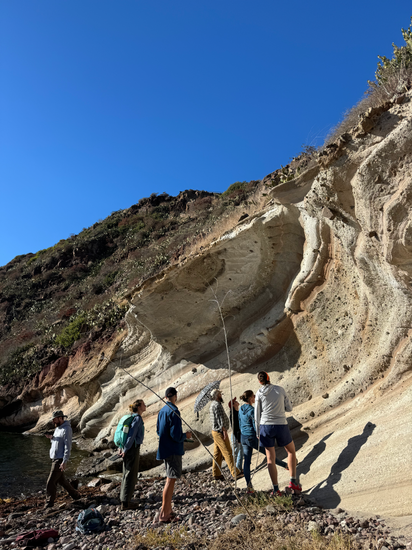
Welcome
Geological research is increasingly a collaborative effort, with teams of scientists working across disciplines to collect, analyze, and interpret data both in the field and in laboratories. This project enhances collaboration in the field by expanding the capabilities of StraboSpot, a digital data system designed for geological research. Through this initiative, StraboSpot will be modified to support group-level workflows, allowing researchers to work more effectively as teams while collecting and analyzing field and laboratory data.
What is StraboSpot
The StraboSpot ecosystem is a network of interconnected applications and software designed to facilitate the collection, management, integration, and sharing of geologic field and laboratory data. The goal of StraboSpot is to align with FAIR principles (Findable, Accessible, Interoperable, and Reusable) and integrate multidisciplinary field and laboratory geologic data types into one shared system. With input from the community, StraboSpot now supports workflows in structural geology, petrology, sedimentology, and tephra volcanology. The system uses controlled vocabularies developed by these communities for standardization of data collection and improve data findability.
StraboSpot provides a shared data repository, and tools for data and image management, using "spots" to link observations across scales and group related data. This approach allows users to connect geologically complex relationships throughout their workflow.
Why this project
Developed in partnership with GeoArray - the SZ4D Integrative Group supporting the collection of interdisciplinary field geoscience data at large scale - this project aligns with an existing community of scientists who are already engaged in collaborative research, from field studies to microscope-based analysis. SZ4D focuses on both fundamental science and issues of societal relevance, such as megathrust earthquakes, strike-slip faults, and volcanic processes. By working closely with SZ4D researchers, this project will develop cyberinfrastructure capability to foster integration, transparency, and seamless data sharing across disciplines.
A key component of this effort is a series of community-driven workshops that will guide the creation of a collaborative digital environment tailored to the needs of geoscientists. This environment will be designed to enhance data collection, interpretation, and communication, ultimately making collaborative research more efficient and accessible to the broader geological community through StraboSpot.
Funding
This project is funded by an NSF grant (Award # 2324712) from the Geosciences Open Science Ecosystem (GEO OSE) Program, which supports innovative approaches that promote open, inclusive, and equitable scientific practices.

What's new
The first workshop took place in Santa Catalina Island/Pimu’gna, off Los Angeles, California in September 2024.
Workshop Objectives
Workshop Goals:
• Define the various types of collaborative workflows for field data collection that participants would like to use
• Identify best practices for collaborative workflows, including ideal methods for collecting and utilizing data
• Determine the necessary Strabo functionalities to support these workflows
• Prioritize the top 1–3 workflows and the corresponding Strabo features needed to implement them, ensuring
Workshop Activities:
-
Discuss example scenarios where group data collection applies, whether in research or teaching
-
Engage in hands-on group data collection exercises to evaluate and refine optimal workflows
Data Collection Topics:
-
Across structure, petrology, geochemistry, and geomorphology
Cailey Condit (University of Washington, SZ4D GeoArray, field trip leader) - Structure, petrology, rheology
Christine Regalla (Northern Arizona University, SZ4D GeoArray, field trip leader) - Structure, neotectonics
Kristin Morell (UC Santa Barbara, SZ4D GeoArray) - Neotectonics, structure , geomorphology
Anaïs Férot (UC Santa Cruz, SZ4D Managing Director) - Igneous Petrology
Adam Booth (Portland State University, SZ4D GeoArray) - Geomorphology, Landslide processes
Caroline Seyler (U Southern California, SZ4D GeoArray) - Microstructures, Deformation experiments
Basil Tikoff (University of Wisconsin-Madison, StraboSpot PI) - field structure, microstructure
Julie Newman (Texas A&M, StraboSpot PI) - Rheology, microstructure
Doug Walker (Kansas University, StraboSpot PI) - field geology, tectonics, geochronology
Clare Martin - StraboSpot Program Coordinator
Nick Roberts (Hamilton College, StraboSpot) - storyboarding, field and micro structural geology
Field Trip Participants



















